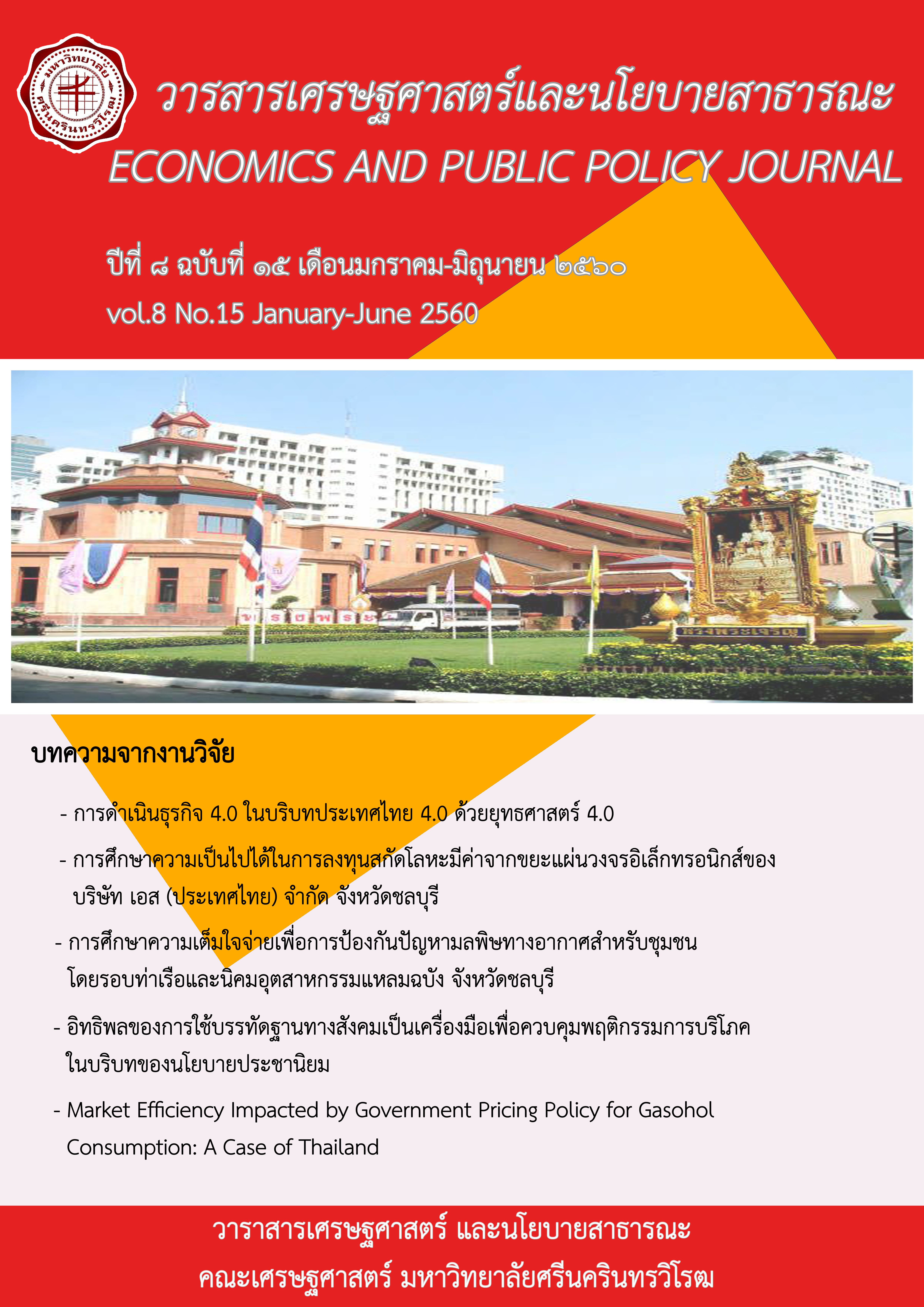อิทธิพลของการใช้บรรทัดฐานทางสังคมเป็นเครื่องมือเพื่อควบคุมพฤติกรรมการบริโภคในบริบทของนโยบายประชานิยม
Main Article Content
บทคัดย่อ
บรรทัดฐานทางสังคมหรือสิ่งที่สังคมกำหนดว่าคือความดีงาม เป็นปัจจัยหนึ่งที่กำหนดพฤติกรรมขอผู้บริโภค การวิจัยในครั้งนี้มีวัตถุประสงค์เพื่อศึกษาพฤติกรรมของผู้บริโภคต่อสินค้าฟรีภายใต้บริบทของบรรทัดฐานทางสังคม โดยใช้การวิจัยเชิงทดลองจากกลุ่มตัวอย่าง 90 คน แบ่งออกเป็น 2 กลุ่ม ได้แก่ กลุ่มที่มีผู้สังเกต (พื้นที่เปิด) และไม่มีผู้สังเกต (พื้นที่ปิด) การทดลองมีขึ้นบริเวณโรงอาหารสถาบันบัณฑิตพัฒนบริหารศาสตร์ ผลการทดลองพบว่ามีความแตกต่างกันอย่างมีนัยสำคัญระหว่างค่าเฉลี่ยของทั้งสองกลุ่ม ผู้เข้าร่วมการทดลองในกลุ่มแรก (มีผู้สังเกต) จะหยิบสินค้าในปริมาณที่น้อยกว่า เนื่องจากอยู่ต่อหน้าผู้อื่นจึงต้องแสดงตนตามบรรทัดฐานของสังคมไทยคือ ความเอื้อเฟื้อเผื่อแผ่ที่จะแบ่งปันสินค้าให้ผู้เข้าร่วมทดลองรายอื่นๆ ขณะที่กลุ่มที่ไม่มีผู้สังเกตสามารถหยิบสินค้าได้มากตามต้องการ ในด้านการวิเคราะห์ตัวแปรควบคุมที่อาจส่งผลกระทบต่อปริมาณการหยิบสินค้าฟรีพบว่า เพศหญิงหยิบสินค้าฟรีมากกว่าผู้ชายและการที่อายุยิ่งมากยิ่งหยิบสินค้ามากขึ้นอย่างมีนัยสำคัญทางสถิติที่ระดับ 0.05
Article Details
สงวนลิขสิทธิ์ © 2553 คณะเศรษฐศาสตร์ มหาวิทยาลัยศรีนครินทรวิโรฒ
คณะเศรษฐศาสตร์ มหาวิทยาลัยศรีนครินทรวิโรฒ จัดพิมพ์วารสารเศรษฐศาสตร์และนโยบายสาธารณะ เพื่อเผยแพร่บทความวิชาการทางเศรษฐศาสตร์ นโยบายสารธารณะ และสาขาอื่นๆที่เกี่ยวข้อง ทัศนะและข้อคิดเห็นใดๆ ที่ปรากฏในวารสารเป็นความคิดเห็นส่วนตัวของผู้เขียน โดยบทความที่ได้รับการตอบรับจะถือเป็นลิขสิทธิ์ของคณะเศรษฐศาสตร์ มหาวิทยาลัยศรีนครินทรวิโรฒ
บรรณาธิการ อาจารย์ ดร.พลพัธน์ โคตรจรัส
เอกสารอ้างอิง
วรรณพงษ์ ดุรงคเวโรจน์. (2 ธันวาคม 2559). นโยบายแจกเงิน 3,000 บาท จน-ไม่แจก แจก-คนไม่จน. สืบค้นจาก https://wannaphong.blogspot.com/2016/12/3000.html
สฤณี อาชวานันทกุล. (18 มกราคม 2016). ประชาชน ประชานิยม และประชารัฐ (1). สืบค้นจาก https://thaipublica.org/2016/01/populism-pracharat
Ahmed Driouchi, Youssef Chetioui, and Meryem Baddou. (2011, july 20). How zero price affects demand? : experimental evidence from the Moroccan telecommunication market. Ifrane, Morocco.
Amadeo, K. (2017, January 26). Law of Demand: Definition, Explained, Examples. Retrieved from https://www.thebalance.com/law-of-demand-definition-explained-examples-3305707
Ariely, D. (2008). Predictably Irrational. New York: HarperCollins.
Ariely, Dan, Uri, Gneezy, and Ernan, Haruvy. (2006, December). Social Norms and the price of zero. Boston, Massachusetts, United States.
Björn A. Hüttel , Christian J. Wagner , and Jan H. Schumann. (2016). Adding New Perspectives to the Zero-Price Effect: The Role of Non-monetary Cost Perceptions. In L. P. (eds.), Rediscovering the Essentiality of Marketing. Passau.
Eliasson, J. (2012, November 27). how to solve traffic jams. Retrieved from https://www.ted.com/talks/jonas_eliasson_how_to_solve_traffic_jams
J. L. Nicolau, and R. Seller. (2012). The Free Breakfast Effect: An Experimental Approach to the Zero Price Model. Journal of Travel Research, 243-249.
Julia Müller and C.W. Messelink. (2014). The Power of Free literature study to the zero price effect. Rotterdam .
Kristina Shampanier, Nina Mazar, and Dan Ariely. (2007). Zero as a Special Price: The True Value of Free Products. Marketing Science, 742-757.
Michal S. Gal and Daniel L. Rubinfeld. (2015, january). The Hidden Costs of Free Goods: Implications for Antitrust Enforcement.
Mikhail Votinov, Toshihiko Aso, Hidenao Fukuyama, and Tatsuya Mima. (2016, April 20). A Neural Mechanism of Preference Shifting Under Zero Price Condition. Retrieved from https://www.ncbi.nlm.nih.gov/pmc/articles/PMC4837161/
Paulas, R. (2015, December 24). THE STRANGE EFFECTS OF FREE STUFF. Retrieved from https://psmag.com/economics/free-love-man
Sällberg, H. (2014). The Zero-Price Effect Extended? An Empirical Study of Multi-Component Online Mobile Services. Academy of Marketing. Bournemouth.
Saraiva, F. G. (2011). Free Products and Their Impact on Consumer Behavior. Porto, portugal.
Study.com. (2014, November 19). What is the Law of Demand in Economics? Retrieved from https://study.com/academy/lesson/what-is-the-law-of-demand-in-economics-definition-example.html
Wilkie, F. (2015, April 20). Identity Economics and Socail Norms at Zero Price. Retrieved from https://economics.nd.edu/assets/165170/
Achavanuntakul, S. (2016, January 18). people populism and civil state. Retrieved from https://thaipublica.org/2016/01/populism-pracharat/
Bisonyabut, N. (2559, january 10). What is the difference between civil state and populist policy, and what will people get achieve from these policies. Retrieved from https://www.posttoday.com/social/think/409357
Durongkaveroj, W. (2016, December 2). conditional cash transfer 3,000 baht, Poor people - not received , received - not poor. Retrieved from https://wannaphong.blogspot.com/2016/12/3000.html


